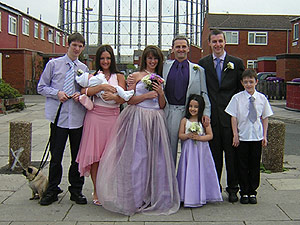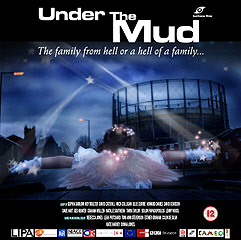
| HOME |
| NERVE |
| REVIEWS |
| ARCHIVE |
| EVENTS |
| LINKS |
| ABOUT US |
| CONTRIBUTORS |
| BACK ISSUES |
| CONTACT US |
Back to index of Nerve 10 - Spring 2007
 Under
the Mud
Under
the Mud
"With a tip of the cap to early Mike
Leigh films and Trainspotting, Under The Mud tells the story of a working
class family in Liverpool struggling to keep the family unit together.
Joe Potts, the patriarch of the oddball family, has loose ties with the
Liverpool underworld, and despite Joe's obvious flaws as a father and
husband, he makes great efforts to ensure that his family remains together.
The glue that binds is family friend Magic, who finds himself as mediator,
motivator and conscience of the family. Written by Liverpudlian teenagers,
Under The Mud explores deteriorating family values with human compassion
and quite a bit of humour. An exceptionally detailed view of the modern
working class British family, the film is one of the best examples of
the struggles these families face to stay together. The small victories
in life are what keep this family going in spite of the near-daily chaos."
Quote from the Victoria Independent Film &
Video Festival 2007
For many people the mention of youth clubs elicits images of a dismal church hall or tatty looking community centre. The 'tabo' (table tennis) table with bats with no rubber and a ball that the big ugly lad stamped on every time it went near him. The pool cues with no tips, unmatching chipped balls, which required the skills of Dynorod to remove from the inner workers of the table. As for the staff: She, some well meaning liberal youth worker dressed in Laura Ashley and Doc Martens doing good through her work with the great unwashed: He, some terse, a bit too sweaty older man, with just a little bit too much fondness for getting you in a body lock when you blagged the girl on the coffee bar: gender entrenched discos where the girls danced the lads got fucked on cider and mad dog, and the bogs were carpeted in diced carrot spew fifteen minutes into the evening.
Interchill, or Speke Garston Young Persons Internet Drop In Centre, to give it its full title, is a different kind of youth project. A converted shop on a high street location hosts an intimate and welcoming 'drop in' area with TV, Sound System, comfy seating, and, its main resource, a state of the art ICT Suite of 14 G5 iMacs, printers, cameras and video etc.
It does however have much in common with the great tradition of informal
education and youth work. The programme and staff have to be engaging,
young people have got to want or need to attend, and if they don't, they
won't - they vote with their feet. No bribery to stay on, no educational
allowance, no badly paid training scheme or referral order. Young people
use the project due to it being attractive, relevant and responsive.
Meeting that need 20+ hours per week takes a lot of doing and throughout
its more than seven years the project has been determined to make the
most of partnership working. So when, several years ago, Hurricane Films
approached us saying they wanted to create a script based on the day-to-day
life reality of our young people we were only too willing to oblige.
Now walking in cold to a youth project is never an easy task. Building meaningful, trusting relationships with young people is a long haul, so the first task was to align the Hurricane staff with our programme and be clear with the young people that our guests were neither:
1. Bizzies
2. Pedoes
3. Bailiffs
4. Drug Squad.
Having achieved this, our small back room was the venue for some very colourful, frank, personal stories. X had an imaginary friend 'Georgina'. Nothing too strange there, except everyone in her friendship group and family acted as if Georgina was real too - the imaginary girl had her own place (empty seat) at the table and was a font of imagined wisdom. Y had a christening, the dads ex 'colleague' was due out of Walton soon, the family parties, the community support. The dog that shat everywhere but was loved by everyone. The Es and the coke, the dodgy deals and the sense of community. And remember this is two years before Shameless hit our screens.
The initial concept was that our young people would write the script, but in truth, for most of our lot the chat and the ideas, sharing the almost unworldly reality of their lives was tough enough. To put pen to paper, something they had never found their education capable of enthusing them about, was always going to be a long shot.
So the 'script writing' process was developed by other young people,
more able to engage in another level. A few years on, when the script
had become reality, young people from the project had an other opportunity
to engage in the more practical, less visceral reality of making a film...
auditions,
hosting the film production,
creating the sets & other practicalities, etc, etc.
 Two of
the young people involved in the film ‘Under The Mud’ were
Adam Bailey (15) and Antoney Reilly (15). Neil
Winterburn (NW) had a chat with them in the Urban Village Hall at
a Youthpoint club night in Garston.
Two of
the young people involved in the film ‘Under The Mud’ were
Adam Bailey (15) and Antoney Reilly (15). Neil
Winterburn (NW) had a chat with them in the Urban Village Hall at
a Youthpoint club night in Garston.
NW: How were you involved in the film?
Reilly: I worked on getting the garden
ready so that they could do the shots with the old van.
Bailey: I was asked by the Interchill
youthworkers to go do down to this, er, what do you call it? audition,
at the urban village hall, so I went down and had a go for one of the
parts.
NW: Were you nervous?
Bailey: No not at all, I’d never
done anything like that before so I had no fear, not like now when I go
for an audition I’m really nervous.
NW: What was the character you played
like?
Bailey: He was like a little demon,
a terror. Obsessed with cars.
NW: Was he anything like you?
Bailey: In some ways, but I’m
not really into cars, so no.
NW: Reilly, what was the best bit of
the filming?
Reilly: It was ages ago now so it’s
hard to remember, but I do remember we had a laugh doing out the garden.
The premier was the best bit.
NW: How about you Adam?
Bailey: Getting to drive the car.
NW: You didn’t really drive the
car though did you? I thought it was on a trailer.
Bailey: No I really drove it. It was
on an old runway strip, so I just put my head down, I couldn’t see
how fast it was going, but it was fast!
-Adam is gesturing some kind of head down blind panic.
NW: Adam, did you know you could act
before being involved with the film?
Bailey: Not really, I’d done a
few school plays, but nothing really big like this.
NW: What did you think to the premiere
at the Philharmonic Hall?
Bailey: It was amazing to see that
many people there. Even if it doesn’t get shown at cinemas all over
the country, I don’t mind. That was enough for me.
NW: How did you cope with the fame after
having hundreds of people cheering for you in the Phil?
Reilly: He did get a bit big-headed
for a while. (Laughs).
Bailey: It was brilliant, that was probably
one of my best nights ever, and I got my own applause off everybody when
my name went up at the end.
NW: Any groupies?
Bailey: No, but I did get people from
the film coming up to me and asking me to meet their brothers and mates
and that. That was mad.
NW: How well do you think the film described
family life in Garston Under the Bridge?
Bailey: It was a comedy film so it’s
not meant to be dead realistic, but to be honest in some ways it was a
bit like what people from outside think of the area. All dysfunctional
families and all that. You do get some families like that but most of
the people round here are nothing like that.
Reilly: Yeah, it’s not really
that mad round here. But fair enough it was a comedy, and it is funny.
NW: What advice would you give to someone
wanting to make a similar kind of film?
Bailey: I’d say to find out what
the area’s really like so you get it right, and make sure that you
get actors from the local area that you’re making the film about,
instead of all these drama class kids.